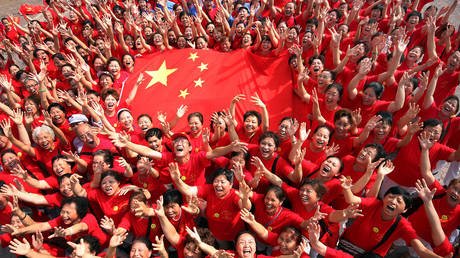Despite efforts by the Trump administration to pressure Beijing into reducing the US-China trade deficit, the trade surplus with the US still reached $323.32 billion last year – the highest level since 2006.
The trade surplus grew 17 percent from around $275 billion a year ago, China’s General Administration of Customs announced on Monday. The figure is the highest on record since 2006, according to government-affiliated Global Times newspaper.
Exports to the US surged 11.3 percent year-on-year in 2018 to $478.4 billion, while imports from the US to China rose a scanty 0.7 percent over the same period.
Also on rt.com Chinese investment in US plunges 83% amid simmering trade warThe data raises questions about the success of the trade war and increased tariffs imposed by US President Donald Trump against China in an attempt to reduce the US trade deficit. The levies targeted hundreds of billions of dollars worth of Chinese goods last year and forced Beijing to retaliate.
Washington was threatening even higher tariffs before Trump and Chinese President Xi Jinping agreed on a 90-day truce in December.
The trade surplus with Washington was not the only record for Beijing in 2018, according to the released customs data. Despite a volatile year, overall foreign trade volume rose 12.6 percent to record $4.62 trillion.
Exports growth in 2018 was the highest in 7 years, surging 9.9 percent while imports grew 15.8 percent compared with last year.
“China effectively tackled changes of the external environment last year, and the foreign trade maintained stable and positive growth, reaching a historic high in import and export volume,” the customs spokesperson, Li Kuiwen, said on Monday. He added that cooperation with Belt and Road countries “has become new driving force of China’s foreign trade development.”
China’s trade growth may slow in 2019 due to external uncertainties and rising protectionism, Li warned.
Even though export growth was the highest since 2011, last year’s overall Chinese trade surplus fell to the lowest level since 2013. In December, exports and imports unexpectedly fell 4.4 percent and 7.6 percent respectively from a year earlier.
In an apparent reaction to the news, major Asian indexes tumbled on Monday. Hong Kong’s benchmark Hang Seng lost 1.38 percent, while the Shanghai Composite index fell 0.71 percent to finish its trading day at 2,535.77. Only Japan’s Nikkei 225 did not slip among others, rising nearly 1 percent.
For more stories on economy & finance visit RT's business section

